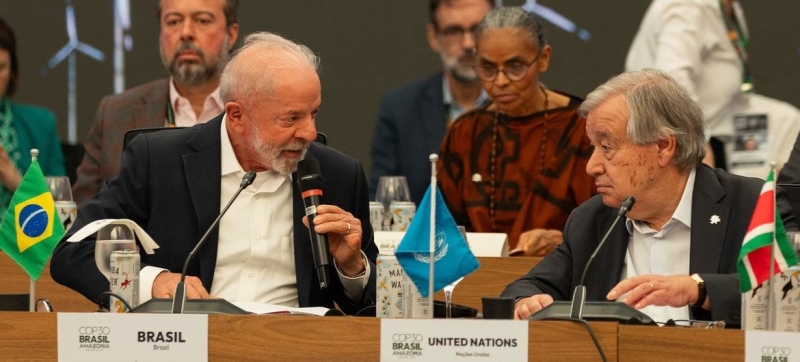- Iran vows to hit all ME economic hubs if US-Israeli attacks persist |
- Sammilito Islami Bank merger to continue: Governor |
- Biman Suspends Flights to Six Middle East Cities Over Tensions |
- Govt Announces 25pc Rail Fare Discount |
- Middle East War Puts Bangladesh Jobs at Risk |
Guterres Urges Fair, Fast, Final Shift to Clean Energy

UN Secretary-General António Guterres (right) joins a discussion on energy transition in Belém, Brazil.
UN Secretary-General António Guterres is pushing to accelerate the global switch from fossil fuels to clean energy – “the cheapest source of new electricity in nearly every country.”
He made the call on Friday during the Energy Transition Roundtable in Belém, Brazil, just days before the formal opening of the COP30 climate change conference.
“The fossil fuel age is ending. Clean energy is rising. Let us make the transition fair, fast, and final,” he said.
‘Renewables revolution’ underway
Guterres told world leaders that “the global energy landscape is changing at lightning speed.” Green energy sources accounted for 90 per cent of new power capacity last year, while investment in them reached $2 trillion – $800 billion more than in fossil fuels.
“The renewables revolution is here,” he said. “But we must go much faster and ensure all nations share the benefits.”
The international community must ensure a “just, orderly, and equitable” transition from fossil fuels, triple renewable energy capacity, and double energy efficiency by the end of the decade.
Keep global warming in check
However, countries are falling short. Even if new national climate plans are implemented, global temperature rise is still expected to exceed 2 degrees Celsius above pre-industrial levels.
“That means more floods, more heat, more suffering – everywhere,” he warned. “To return below 1.5 degrees by century’s end, global emissions must fall by almost half by 2030, reach net zero by 2050, and go net negative afterwards.”
Focus on policies and people
Guterres outlined five key areas for action, first calling on countries to “align laws, policies, and incentives with a just energy transition and eliminate fossil fuel subsidies that distort markets and lock us into the past.”
Governments must “put people and equity at the centre of the transition” and support workers and communities who depend on oil, coal, and gas for their livelihoods, including through training and new opportunities – particularly for young people and women.
Support for developing countries
“Invest in grids, storage, and efficiency. Renewables are surging, infrastructure must catch up – fast,” he said.
“Technology must be part of the solution, not a new source of strain,” he added, noting that clean energy must power all new electricity demand, “including from the data centres driving the AI revolution.”
He stressed the need to “unlock finance at scale for developing countries,” noting that Africa receives just two per cent of global clean energy investment.
“We must support developing countries in transitioning away from fossil fuels through stronger cooperation, investment, and technology transfer – calibrated to different capacities and dependencies,” he said.

